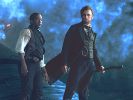Eye For Film >> Movies >> Abraham Lincoln: Vampire Hunter (2012) Film Review
You’ve got to admit, as a Hollywood pitch it takes some beating. The epic story of the self-taught backwoodsman who freed the slaves and won the Civil War – with extra chopsocky action and Southern Gothic horror on the side.
Fortunately, Timur Bekmambetov’s all-guns-blazing screen version of Grahame-Smith’s mash-up novel is as silly-but-fun as you’d expect the highest of ‘high-concept’ films to be, offering enough bravura set pieces, period atmosphere and straight-faced dialogue to make you forget how utterly ludicrous the entire premise actually is.

In case you hadn’t guessed, said premise is that the 16th president of the United States (and still one of the most respected and admired of that motley bunch) was also Abe The Vampire Slayer; traumatised in childhood when his mother is killed by a vampire running a lucrative sideline as a slave master, he grows up vowing vengeance on the undead and all who assist them.
His cack-handed early attempts almost prove fatal, but he is rescued and mentored by Henry Sturgess (Dominic Cooper) an aristocratic Englishman who reveals the grim truth – vampires have emigrated to the New World in hordes and are colluding with the Southern states to ensure that slavery continues and spreads, thus providing them with a food source to be consumed at will and with no comebacks.
Lincoln realises his destiny is to fight the twin evils and as his political career develops so does his talent for taking the ‘un’ out of ‘undead’. But his calling puts his family at risk – and brings him to the attention of the vampire legion’s supreme commanders...
Grahame-Smith’s original novel was a relatively subtle affair, using a classic ‘found manuscript’ device to delicately weave a supernatural subplot into a straight-arrow biography of the Kentucky farm boy who became a self-taught lawyer and a politician who (in Alistair Cook’s words) ‘dignified the trade like few men before or since’. But Bekmambetov (who gave a dazzling calling card as an action director with the Night Watch series and made an even sillier premise ridiculously entertaining in his Hollywood debut Wanted) clearly has neither the time nor the inclination to explore the parallels between vampirism and slavery (seen from the opposite end of the civil rights prism in HBO’s True Blood) or flesh out the personal and political compromises has to make in both his true-life and fictional incarnations.
Instead, the plot follows what might be called the classic post-Buffy take on the vampire myth, in which a destined ingénue is tutored by older and wiser savant, who turns out to have their own flaws and secrets; brawn rather than brain generally proves the key to success (obviously there were more wire-fu training schools in early 19th-century America than the history books have recorded); and the vampires themselves are animalistic bogeymen rather than subtle seducers.
It’s been the template for a wearisome parade of straight-to-video splatfests but Bekmambetov has an undoubted flair for adrenaline-rush cinema and he invests the action set pieces (notably a dizzying, disorienting duel on horseback) with a visual flair, eye for quirky detail and general ‘everything-but-the-kitchen sink’ approach that recalls Paul Verhoeven in his prime. But he also has an eye for mood and visual spectacle, creating a stunning CGI version of the New Orleans waterfront and homaging Leone with a posse of vampire minions, cloaked and masked against the sun.
Grahame-Smith’s script manages to condense the original novel to a manageable beast, giving a decent sense of Lincoln’s remarkable true-life story and keeping the dialogue straight and largely clunker-free. He’s helped immensely in this by the cast. In the title role, Walker initially seems a little stiff but this actually fits well with the folksy hick persona of the young Lincoln, gradually acquiring his legendary gravitas and crusading fire.
Cooper cuts an appropriately Byronic dash as the flawed mentor and Mary Elizabeth Winstead is suitably radiant and dignified as Mary Todd, the love of Lincoln’s real-life. But there’s no doubt who has the plum role. When reading the novel I thought the one thing it missed was a suitably evil, lordly and preferably Brit-accented nemesis for Old Abe; step forward, Rufus Sewell. Literally sinking his teeth into the role of the elegantly sadistic millennia-old master-vampire, he proves once again that when it comes to bad guys he has few equals.
Like the rest of the film, his performance is a bit of knowing but not too knowing fun. It’s not to be mentioned in the same breath as classics such as Nosferatu, Dreyer’s Vampyr and Todd Browning’s 30s version of Dracula, of course, but has the vulgar verve of Hammer at its best. A bit more genuine creepiness and suspense would have improved things, and there’s no doubt that the film goes off the boil in the second half, before rousing itself for a climax that literally builds up a good head of steam.
It’s occasionally a bit too irreverent (re-imagining a genuine, and crucial, Civil War battle as a human/vampire face-off struck me as misjudged, though it provides another striking set-piece, as undead regiments prove immune to musketry) and essentially as insubstantial as a plate full of crisps. But just as guiltily enjoyable.
Reviewed on: 02 Jul 2012





















